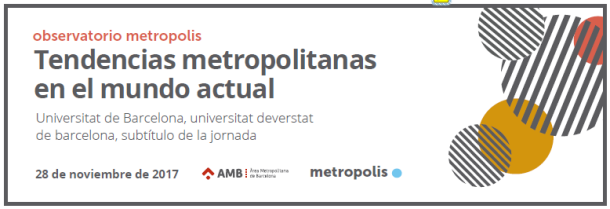 One mega event 2018
One mega event 2018
Mobility as a Democratizing Tool for Our Cities
Tapping into European Mobility Week, which this year takes place between 16 and 22 September, Metropolis Women project officer at the Secretariat General, Silvia Llorente, writes about our association’s commitment to metropolitan mobility from a gender perspective
From the Metropolis vision “Metropolises for and by their citizens” where participatory and effective metropolitan governance fosters economic development, sustainability, social cohesion, gender equality and quality of life, we regard the gender perspective as a key principle to include across all models of governance. We also support city governance committed to the 2030 Agenda to deliver on gender equality (SDG5) and the development of inclusive, safe, resilient, and sustainable cities (SDG11).
It is true that many of our cities have grown on the basis of a model grounded on the distant city, on disperse and unlimited growth in which women’s viewpoints, needs, and experiences are subordinated, providing unequal access to goods and services and therefore opportunities. We face social inequalities that impact the most underprivileged communities (due to sex, class, origin, ethnicity, etc.) and environmental problems that threaten the quality of life and social cohesion of metropolitan people.
In contrast to this model, we propose the design of diverse, caring and sustainable cities that cover all of the requirements and know-how of everyday life and which put all people at the heart of policies. Planning and governance with a gender perspective thus form the most powerful framework for establishing more sustainable, inclusive and safer cities for the totality and diversity of realities and stakeholders, and therefore, the maximum expression of the democratic right to citizenship in any of its variations of choice, of trips, the enjoyment of spaces, values of use, and access to environments.
In this context, metropolitan mobility is the quintessential democratizing tool for achieving the right to the city and an indispensable condition for the access and social, cultural, and economic engagement of people, principally those who have been made invisible, i.e., women.
With this awareness, last year we organized the workshop “Mobility and Sustainability with a Gender Perspective in Metropolitan Areas” to discuss and exchange outlooks and experiences on the principles of mobility and sustainability in our cities; principles that are intrinsic to the collective right to the city and fundamental for the construction of more democratic, inclusive, and sustainable metropolises.
One outcome of this event was a taskforce for the collaborative drafting of the document “8 key messages to promote sustainable mobility from a gender perspective in our cities“, organized under the principles of Right to the City and Caring City.
Mobility analyses have traditionally considered compulsory trips to be those related to formal, male work to the exclusion of those related to all the more female-based care-related tasks. However, it is these trips which enable everyday life to function, even though their parameters (short, multiple, and complex trips conducted outside of established timetables, on foot or by public transport) are hard to include in mass mobility strategies despite being more sustainable.
To address this situation, sustainable cities need to adopt a metropolitan approach regarding the right to mobility based on women’s mobility parameters, characterized by proximity and rational trips, inclusive and interconnected public transport; which foster the creation of communication networks from the center to the outlying areas and around as an instrument for the democratic and equal representation and participation of all people through access to goods and services that generate economic, social, and cultural wealth. This vision contrasts with the predominantly androcentric model of private transport that is fairly unsustainable from an environmental perspective.
We are therefore committed to sustainable mobility with a gender perspective as one of the core pillars for building and accessing diverse, caring, and sustainable cities, planned to facilitate everyday life, fostering proximity among different urban activities, a mix of uses and the idea of compactness.
By doing so, we support the need for the sustainable planning of our cities as the stages of the lives of the people who live in them, breaking down the dichotomy between public space (productive) and private space (reproductive) to build an inclusive and comprehensive public space understood as an ongoing interface of people’s lives, a meeting place where people relate to and care for each other, underscoring everyday life and reappraising it against the overestimation of productive work.
If your city is similarly committed to metropolitan mobility from a gender perspective, we invite you to join this campaign and share your experiences with the Metropolis Secretariat-General team.
Author: Silvia Llorente Sánchez, Metropolis Women Officer


